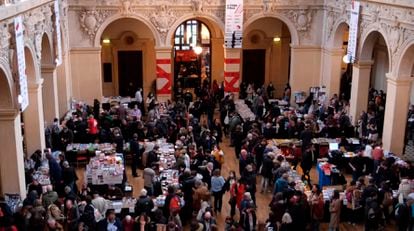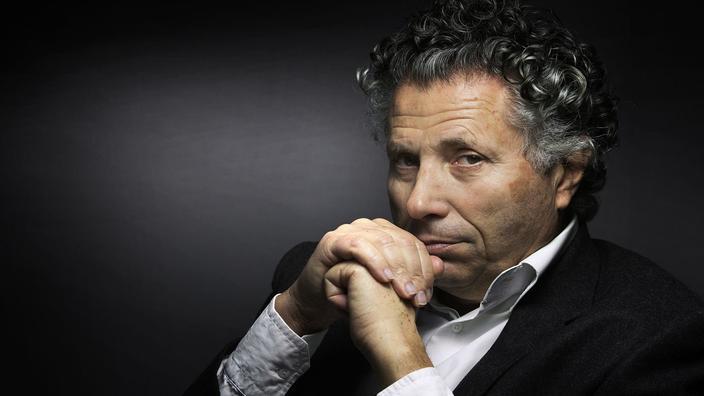A ghost is haunting Europe, but it is not the one predicted by Marx and Engels.
Today, Sunday, the French presidential elections are held, with the far-right Marine Le Pen's chances intact of achieving a good result, a cold, windy and snowy Lyon hosted last weekend the Quais du Polar, the great European gathering of crime fiction.
A perfect climate to launch the big question: what can crime novels, the most social and combative genre, do in the face of what some authors agree in calling “the brown plague”?
Is that your role?
The literature does not seem to have the solution, but it can provide clues.
In the hustle and bustle of the great hall of the Palace de la Bourse, crowded from early in the morning with readers in search of their favorite authors, writers, booksellers and publishers point to Jérôme Leroy as the key man to set the mood.
The French writer (Rouen, 57 years old) wrote in 2011
Le Bloc
(Gallimard), a black novel, political and terrifying for its visionary capacity, which placed a woman clearly inspired by Le Pen on the brink of the presidency.
“The black genre is, more than ever, the best instrument to address this phenomenon.
It is extremely pertinent because it does not set its sights where the immediate news of journalism is.
The genre writer can react by molding reality to his liking, something that the journalist cannot do”, he assures.
As a result of the cultural effervescence of these days, a collaboration between the German Max Annas and Leroy emerged in previous editions to produce an exquisite black corpse, a four-handed novel (
Terminus Leipzig
) that gets directly into the expansion, inside and outside the political sphere and the forces of order, of an extreme right that increasingly finds more ways to spread.
“It is not a phenomenon exclusive to France”, he warns, “it has reached Spain, for example, despite the fact that they are vaccinated with Francoism”.
From left to right, Franck Thilliez, Dominique Manotti, Jérôme Leroy and Frédéric Paulin. EL PAÍS
Memory and looking at the past play an essential role in this literary approach to the present.
Frédéric Paulin (Île de France, 50 years old) is a goldsmith of that hybrid that combines history and crime.
The author of
La fabrique de la terreur
(Folio Policier) follows the paths opened by, among others, Hervé Le Corre —winner of the 20 Minutes Readers' Prize in this year's edition of the festival— to tell stories from the recent past whose keys resonate today.
“My novels say that France is not as pure as it likes to present itself.
It is the great country of the rights of man, true, there is a historical sense and all that, it must be recognized, but as a citizen and even more as a writer I feel responsible in a certain way for the memory of my country.
I don't have the answer to all those big questions, but just questioning certain things is already essential, especially when you see how things are in France and the rise of the extreme right.
What can happen to us?” He doubts out loud.
Dominique Manotti (Paris, 79 years old) is a living classic of the French crime novel.
Since her first work,
Sendero sombre
(1995), she is the best representative of the influence and scope of the
neopolar
, ultra-left movement within the genre, started by Jean Patrick Manchette in the 1970s.
A former union representative in the textile industry, Manotti did not spare a single attack in her multiple appearances in the three days of the Quais du Polar.
”France is a country where the real mafias have been underdeveloped because the mafiosi work closely with the political power and there is little space left for traditional organizations.
In France, history and sociology have ignored this, they have not understood the power-mafia symbiosis”, she assures when she talks about her novel
De Ella Marsella 73
(Versatile), which does fulfill, in his opinion, that function.
The book tells how almost 50 years ago there was in that French city a group of ultras who shot Algerian immigrants from moving cars, with a considerable number of dead.
An event that neither the authorities nor the historiography wanted to remember.
"In France there are no racists, so there are no racist crimes," he says, sneering at Pompidou.
“This is the result of that policy that consists of denying.
How is there going to be racism in the country of reason, secularism, human rights?
There is a national narrative, a novel that sings our glories”.
But what about the current situation?
“Good literature is not made with good feelings.
Literature, good literature, can give a voice to those who do not have one, which is not a small thing, ”he launches for those who want to understand it.
Panoramic view of the Palais de la Bourse, during the Quais du Polar in Lyon, last weekend.Quais du Polar
With the authority given to him by the Yorkshire Quartet, a set of works with which he revolutionized the genre, and
GB84
(Tin Sheet), one of the great black novels about the sewers of power in recent years, David Peace (West Yorkshire, United Kingdom, 55 years old), also present in Lyon, closes the debate on the relevance of the political nature of the genre with a sentence: “I read and write criminal fiction to understand what happens in the places where I live and I don't see there is
no reason why
noir
should not be good literature and also have a political character”.
The push of the reader
There is one factor without which crime novels would not be an effective social tool, at least in France: a legion of readers who cling to fiction, a phenomenon of which this festival is the best example.
“I think the power of the black novel is to warn of this danger to democracy and our freedoms.
But it doesn't prevent you from having fun and escaping, it always depends on how you deal with the issues”, explains Franco-Spanish Marc Fernández, author of a trilogy that began in 2015 with
Mala vida
(Les Livres de Poche) and editor-in-chief of the specialized publication
Alibi
.
“I couldn't have all these readers if it wasn't fiction.
That's what the novel is for”, comments Paulin in the same sense.
"Of course it has to have its entertaining part because it's fiction," adds Alice Monéger, editorial director of Éditions Filature(s) -Alibi, one of the best examples of how to use gender to analyze society.
"What I like when I read a
fleece
is to read it as a report, because I'm interested in learning something about a scandal, a part of society that I don't know, a drug issue, the operation of justice," she explains.
Franck Thilliez is a regular at the top of the best-seller lists, a position he achieves with books that are always very close to the present.
“The function of the
polar
”, he assures, “is, above all, collecting stories that, moreover, occur in today's society.
It is a photograph of the world we live in at a given moment.”
In such a turbulent world, Thilliez seeks to "tell the suffering of the people" and reflect how extremisms of all stripes are on the rise.
Others, like Benjamin Dierstein, author of a very black trilogy on the Sarkozy years, point in all directions: “There is a tendency among certain contemporary French authors to look at power and how it manipulates opinion and the population in general, and I think that to that the genre is perfect”, he comments, cigarette in hand, before waving the anarchist flag: “If there were a new
neopolar current
I would have to attack the right, the extreme right and the left, and that is what interests me most.
I don't believe in anything, so what I like is to show that the problem is not political convictions, but the very principle of power”.
This power, in all its dimensions, is actually what the most political crime novel speaks about.
Leroy also speaks of that power in his latest work,
Les derniers jours des fauves
(The last days of the beasts, La manufacture des livres), a political fiction in the near future in constant crisis that is very similar to our present.
“The challenge is such that there is a kind of democratic pessimism.
I wonder how our systems are going to deal with huge crises indefinitely and remain democratic.”
Look to the future and tremble
In recent times, a literary subgenre that crosses various branches of fiction has established itself as a tool for analyzing reality: the speculative novel.
Its mixture with the black genre gives products of some success.
"A
thriller
has a path to follow to build everything in a spiral, supported by a mystery: how will it all end?" explains Elliot Ackerman, present in Lyon with
2034
, a political
thriller
that recounts the consequences of a nuclear war between China and the United States.
The success of this first installment has led this former
marine
to plan a trilogy:
2054
will speculate on a civil war in the US and
2074
about a near-final environmental disaster.
Other times, it is reality that traps the author of fiction.
It's what happened to Christina Sweeny Beard when she was writing
The End of Men
(Umbriel).
The British author finished the book about an evil that kills only the male gender shortly before the outbreak of the coronavirus pandemic, which made her life and the promotion of her literary debut a bit strange.
This is how he explains, during a break from a book signing session, his bet on the
thriller
: "When you have a big social issue on your hands, the story is best told through the vicissitudes of certain characters and that implies that you have to worry for them, and the best way to achieve it is through the
thriller
: Put someone in a difficult, very dangerous, or terrible experience, and you can use that experience to explore a larger idea in a much more engaging way.”


/cloudfront-eu-central-1.images.arcpublishing.com/prisa/H7FOTEWU7BCBPGTXHO6TB6OI3I.jpg)






